#14 Days Everest Base Camp Trek
Explore tagged Tumblr posts
Text
Climb the mountain not to plant your flag, but to embrace the challenge, enjoy the air, and behold the view. Climb it so you can see the world, not so the world can see you." - David McCullough Jr.
#Everest Base Camp Trek#14 Days EBC Trekking Cost 2024#Everest Base Camp Treks#Trek to Everest Base Camp#Everest Base Camp Trekking#Trekking to Everest Base Camp#Everest Base Camp Trek Cost#Everest Base Camp Trek Price#Everest Base Camp Trekking Cost#Everest Base Camp Trekking Price#14 Days Everest Base Camp Trek#14 Days Everest Base Camp Trekking#Everest Base Camp Trek 14 Days#Everest Base Camp Trekking 14 Days#Everest Base Camp Trek 2024#Everest Base Camp Trekking 2024#EBC Trek#EBC Trekking#EBC Trekking Cost
0 notes
Text
#everest base camp trek#everest base camp trekking#everest base camp trek Package#everest base camp trek cost#everest base camp trekking itinerary#trek to everest base camp#everest base camp trek price#Everest Base Camp Trek 14 Days#14 days everest base camp trek#trekking to everest base camp#everest base camp trekking cost#everest base camp trekking package#everest base camp trek 2023#mount everest base camp trek#everest base camp treks
0 notes
Text
5-Day Ghorepani Poon Hill Trek Highlights: 2024 Expert Guide

The Ghorepani Poon Hill Trek is one of the most celebrated trekking routes in the Annapurna region of Nepal, renowned for its breathtaking views, cultural richness, and accessibility. This 5-day trek is ideal for both novice and experienced trekkers, offering a unique blend of stunning landscapes, diverse flora and fauna, and the opportunity to immerse oneself in the local culture. This guide provides an in-depth overview of the trek, its highlights, and essential information for planning your adventure in 2024.
Overview of the Ghorepani Poon Hill Trek
The Ghorepani Poon Hill Trek, often referred to as the Annapurna Poon Hill Trek, is a short yet rewarding trek that allows hikers to experience the majestic beauty of the Annapurna mountain range. The trek typically begins in the picturesque city of Pokhara, known for its serene lakes and stunning mountain views. The route leads through lush rhododendron forests, charming villages, and terraced fields, culminating at Poon Hill, a renowned viewpoint that offers panoramic vistas of the Annapurna and Dhaulagiri ranges.
Key Features of the Trek
Accessibility: The trek is easily accessible from Pokhara, making it a popular choice for travelers with limited time.
Cultural Experience: Trekkers have the opportunity to interact with local communities, particularly the Gurung and Magar people, known for their hospitality and rich cultural heritage.
Stunning Sunrises: Poon Hill is famous for its breathtaking sunrises, where the first rays of sunlight illuminate the snow-capped peaks, creating a magical atmosphere.
Moderate Difficulty: The trek is suitable for individuals of varying fitness levels, as the trails are well-maintained and do not require technical climbing skills.
Itinerary Overview
The following is a detailed itinerary for the 5-day Ghorepani Poon Hill Trek, which includes daily activities and highlights.
Day 1: Arrival in Kathmandu
Upon arrival at Tribhuvan International Airport in Kathmandu, trekkers are greeted and transferred to their hotel. The day is spent preparing for the trek, including packing and arranging necessary gear. In the evening, a welcome dinner is often organized, providing an opportunity to meet fellow trekkers and guides.
Day 2: Drive to Pokhara and Trek to Tikhedhunga
The next morning, trekkers embark on a scenic drive to Pokhara, which takes approximately 6-7 hours. Upon reaching Pokhara, the journey continues to Nayapul, the starting point of the trek. The first day of trekking involves a gentle ascent to Tikhedhunga, where trekkers will spend the night. The trail passes through charming villages and lush forests, offering glimpses of the local lifestyle.
Day 3: Trek to Ghorepani
On the third day, trekkers face a more challenging ascent as they make their way to Ghorepani. This section of the trek includes a steep climb of about 3,300 steps at Ulleri, but the effort is rewarded with stunning views of the surrounding mountains. Ghorepani is a vibrant village that serves as a base for the trek to Poon Hill and offers various accommodations and dining options.
Day 4: Sunrise at Poon Hill and Trek to Tadapani
Early in the morning, trekkers set off before dawn to reach Poon Hill for the sunrise. The hike takes approximately 45 minutes to an hour, and upon reaching the viewpoint, trekkers are treated to a spectacular display of colors as the sun rises over the Annapurna range. After soaking in the views, the group descends back to Ghorepani for breakfast before continuing the trek to Tadapani. This leg of the journey features more stunning landscapes, including rhododendron forests and views of Machapuchare (Fishtail Mountain).
Day 5: Trek to Ghandruk and Return to Pokhara
The final day of trekking involves a descent to Ghandruk, a traditional Gurung village known for its cultural significance and beautiful architecture. After exploring Ghandruk, trekkers make their way back to Nayapul, where transportation awaits to return them to Pokhara. The trek concludes with a relaxing evening in Pokhara, where trekkers can enjoy the local cuisine and reflect on their adventure.
Highlights of the Trek
1. Poon Hill Sunrise
The highlight of the Ghorepani Poon Hill Trek is undoubtedly the sunrise at Poon Hill. Standing at an elevation of 3,210 meters, Poon Hill provides an unobstructed view of the Annapurna and Dhaulagiri mountain ranges. The sight of the sun rising over these majestic peaks, casting golden hues across the landscape, is a breathtaking experience that leaves a lasting impression on all trekkers.
2. Diverse Flora and Fauna
The trek takes you through diverse ecosystems, from subtropical forests to alpine meadows. The rhododendron forests, in particular, are a major attraction, especially during the spring when the flowers bloom in vibrant colors. Trekkers may also encounter various wildlife, including monkeys, deer, and numerous bird species.
3. Cultural Encounters
The Ghorepani Poon Hill Trek offers rich cultural experiences as trekkers pass through traditional villages inhabited by the Gurung and Magar communities. Visitors can learn about local customs, traditions, and daily life, enhancing the overall trekking experience.
4. Stunning Landscapes
Throughout the trek, hikers are treated to stunning landscapes, including terraced fields, cascading waterfalls, and lush valleys. The changing scenery provides ample opportunities for photography and appreciation of the natural beauty of the Annapurna region.
5. Comfortable Accommodation
The trek is well-supported by a network of tea houses and lodges, providing comfortable accommodation and meals along the way. This infrastructure makes the trek accessible for beginners and those who prefer not to camp.
Practical Information
Best Time to Trek
The best time for the Ghorepani Poon Hill Trek is during the spring (March to May) and autumn (September to November) seasons. During these months, the weather is generally clear, providing excellent visibility of the mountain ranges.
What to Pack
Trekking Gear: Sturdy trekking boots, warm clothing (layers), a waterproof jacket, and a good quality backpack.
Essentials: Sunscreen, sunglasses, a water bottle, and a first-aid kit.
Camera: To capture the stunning landscapes and cultural experiences.
Fitness Level
While the trek is considered moderate, a basic level of fitness is recommended. Trekkers should be prepared for daily hikes of 4 to 6 hours, with some steep ascents.
Conclusion
The Ghorepani Poon Hill Trek is a remarkable journey that offers a perfect blend of natural beauty, cultural richness, and adventure. Whether you are a seasoned trekker or a beginner looking for a memorable experience, this trek in the Annapurna region promises stunning views, warm hospitality, and a chance to connect with nature. As you plan your trek for 2024, consider the highlights and practical information provided in this guide to ensure a rewarding and unforgettable adventure in the heart of the Himalayas.
Annapurna Base Camp Trek
#Upper Mustang Valley Trek#Khopra ridge trek 14 days cost#everest base camp trek cost#island peak climbing#manaslu circuit trek#mera peak climbing cost
0 notes
Text










14 Days Everest Base Camp Trek, our group, is on the way to the Everest Base Camp. BOOKING open for autumn 🍂 2024 and 2025 spring trips. Don't miss the lifetime adventure holiday
0 notes
Text
Cost for Everest Trek Nepal
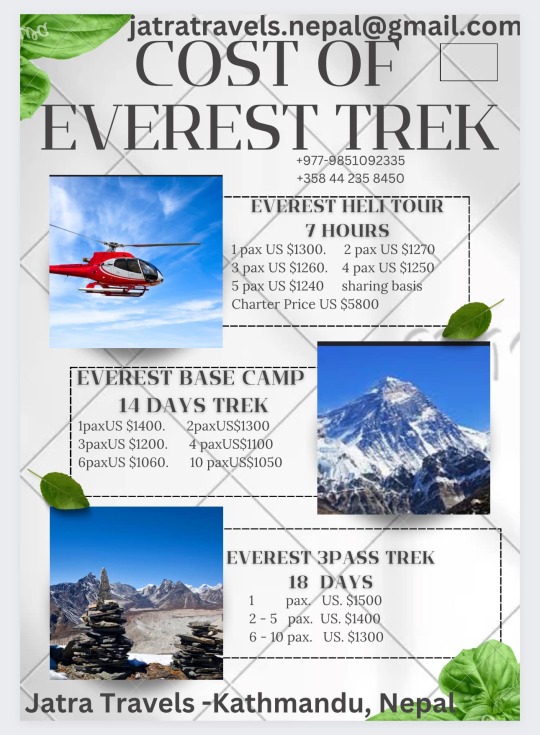
#The Everest Base Camp trek is famous for its stunning scenery#cultural experiences#and the challenge of reaching the base camp of the world's highest mountain. The trek offers breathtaking views of the Himalayas#Sherpa villages#and Buddhist monasteries along the way. Costs for the trek can vary depending on factors such as the duration#accommodations#guides#and equipment rentals#but it typically starts around $1#000 to $4#500 per person for a basic package.#An Everest Heli tour provides a unique perspective of the Himalayas#allowing you to see Mount Everest and other peaks from the air. Costs for a helicopter tour to Everest can range from $1#200 to $6#000 or more per person#depending on the duration and services included.#The time required for the Everest Base Camp trek depends on the route taken and individual preferences#but it usually takes about 12-14 days for a standard trek from Lukla to Everest Base Camp and back. However#some trekkers opt for longer itineraries to acclimatize to the altitude or to explore nearby areas. www.jatratravels.com#nepalFestivalTour#Nepalholidaytour#JatraTravels#jatra#JatraTravelsNepal#nepalTourOrganizer#NepalTrekkingOrganizer#filmpermitorganizer#FilmDocumentey#LocalTourandtravelinkathmandu#videographytourorganizer
0 notes
Text
https://www.scribd.com/document/707848280/A-Beginner-s-Guide-to-Everest-Base-Camp-Trek-Everything-You-Need-to-Know
#everest base camp trek#everest base camp trek 14 days#everest base camp trek itinerary#everest base camp trek package#nepal everest base camp trek#annapurna circuit trek#annapurna hike#annapurna trek package#annapurna circuit trek itinerary#annapurna base camp trek#annapurna base camp trek cost#annapurna base camp trek map#annapurna base camp#manaslu circuit trek#manaslu circuit trek 12 days#manaslu base camp trekking#manaslu circuit trek package#mardi himal trek#mardi himal trek cost#mardi trek itinerary#mardi himal trek package
0 notes
Text
Embarking on the Adventure: A Detailed Exploration of the Everest Base Camp Trek
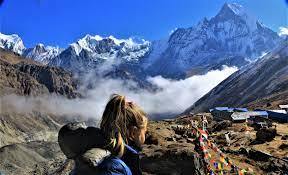
Nestled amidst the towering peaks of the Himalayas lies one of the world's most iconic treks - the Everest Base Camp Trek. This legendary journey beckons adventurers from across the globe to test their mettle against the rugged terrain and breathtaking altitudes of the Khumbu region in Nepal. From challenging trails to awe-inspiring vistas, every step of this trek is imbued with a sense of adventure and discovery. In this comprehensive guide, we delve deep into the heart of the Everest Base Camp Trek, exploring its most daunting challenges, logistical considerations, and the optimal timing for an unforgettable experience.
The Hardest Days of the Everest Base Camp Trek: Conquering the Himalayan Giants
Undoubtedly, the Everest Base Camp Trek presents its fair share of challenges, with several days standing out as particularly demanding for trekkers. Among these, the ascent to Namche Bazaar and the climb to Everest Base Camp itself are widely regarded as the most arduous.
Namche Bazaar Ascend: Situated at an altitude of approximately 3,440 meters (11,286 feet), Namche Bazaar serves as the gateway to the Everest region. The trek from Phakding to Namche involves a steep ascent, testing the endurance and acclimatization of trekkers. The thinning air and rugged terrain make this leg of the journey physically demanding, requiring a steady pace and proper hydration to mitigate altitude-related symptoms.
Everest Base Camp Ascent: As trekkers venture higher into the Himalayas, the journey to Everest Base Camp reaches its climax. The final push from Gorak Shep to Everest Base Camp involves navigating rocky terrain and glacial moraines at altitudes exceeding 5,000 meters (16,404 feet). The thin air and sub-zero temperatures add to the challenge, demanding mental fortitude and physical resilience from adventurers determined to reach the iconic base camp beneath the towering peak of Mount Everest.
Everest Base Camp Trek Cost: Budgeting for Adventure
While the allure of the Everest Base Camp Trek is undeniable, prospective trekkers often wonder about the financial investment required to undertake this epic journey. The total cost of the trek can vary significantly depending on factors such as duration, accommodations, permits, and additional expenses. Here's a breakdown of the main components contributing to the Everest Base Camp Trek cost:
Permits and Fees: All trekkers embarking on the Everest Base Camp Trek are required to obtain permits from the Nepalese government. The two primary permits are the Sagarmatha National Park Entry Permit and the Khumbu Pasang Lhamu Rural Municipality Entrance Permit. These permits help fund conservation efforts and maintain the trekking trails in the region.
Accommodations and Meals: Along the trekking route, trekkers will find a variety of accommodations ranging from basic teahouses to more comfortable lodges. The cost of accommodation typically includes meals, with options ranging from local Nepalese dishes to international cuisine. Trekkers should budget accordingly based on their preferences and comfort level.
Guide and Porter Fees: While not mandatory, many trekkers opt to hire experienced guides and porters to enhance their trekking experience. Guides provide valuable insights into the local culture and geography, while porters assist with carrying gear and easing the physical burden of the trek. The cost of hiring guides and porters varies depending on their experience and services rendered.
Equipment and Gear: Trekking gear such as sturdy hiking boots, warm clothing, and trekking poles are essential for the Everest Base Camp Trek. Depending on the trekker's existing gear and preferences, additional expenses may be incurred to purchase or rent specialized equipment for high-altitude trekking.
Transportation and Miscellaneous Expenses: The cost of transportation to and from Kathmandu, as well as any additional expenses such as souvenirs or optional excursions, should be factored into the overall budget for the trek.
It's important for trekkers to research and plan their budget accordingly, taking into account both essential expenses and discretionary spending to ensure a comfortable and memorable trekking experience.
Everest Base Camp Trek Difficulty: Navigating the Terrain
The Everest Base Camp Trek presents a formidable challenge, combining high altitude with rugged terrain and unpredictable weather conditions. Trekkers should be prepared to face the following difficulties along the journey:
Altitude: As trekkers ascend into the Himalayas, they will experience a significant increase in altitude, leading to reduced oxygen levels and potential altitude-related symptoms such as headaches, nausea, and fatigue. Proper acclimatization and gradual ascent are essential to minimize the risk of altitude sickness.
Terrain: The trekking trails vary from rocky paths to steep inclines, requiring steady footing and endurance. Trekkers should be prepared for long hours of walking on uneven terrain, including ascents and descents over mountain passes and glacial moraines.
Weather: The weather in the Everest region can be unpredictable, with temperatures ranging from mild to sub-zero depending on the season. Trekkers should be prepared for sudden changes in weather conditions, including snowfall, high winds, and freezing temperatures, particularly at higher altitudes.
Physical Fitness: While no technical climbing skills are required for the Everest Base Camp Trek, a good level of physical fitness is essential to tackle the long hours of trekking at high altitude. Regular cardiovascular exercise and strength training can help prepare trekkers for the physical demands of the journey.
Despite these challenges, countless adventurers successfully complete the Everest Base Camp Trek each year, drawn by the promise of breathtaking scenery and a profound sense of accomplishment.
Best Time for Everest Base Camp Trek: Navigating the Seasons
Choosing the optimal time to embark on the Everest Base Camp Trek is crucial for maximizing enjoyment and minimizing potential challenges. While the trek is possible throughout the year, each season offers its own unique advantages and considerations:
Spring (March to May): Spring is widely considered the best time for the Everest Base Camp Trek, offering clear skies, mild temperatures, and blooming rhododendrons along the trail. The visibility is excellent during this season, allowing trekkers to enjoy panoramic views of the surrounding peaks, including Mount Everest.
Autumn (September to November): Another popular season for the Everest Base Camp Trek, autumn brings stable weather conditions and crisp mountain air. The skies are generally clear, offering unobstructed views of the Himalayan peaks. Trekkers can also witness the vibrant fall colors as the foliage changes during this time of year.
Winter (December to February): While winter brings colder temperatures and occasional snowfall to the Everest region, it also offers quieter trails and stunning snow-covered landscapes. Trekkers should be prepared for cold weather and limited facilities along the route, but the solitude and tranquility of the winter months can be deeply rewarding for those seeking a unique adventure.
Summer (June to August): The summer months in Nepal coincide with the monsoon season, bringing heavy rainfall and cloudy skies to the Everest region. Trekking during this time can be challenging due to muddy trails, leeches, and reduced visibility. However, trekkers who are undeterred by the rain can experience lush green landscapes and fewer crowds along the trail.
Ultimately, the best time for the Everest Base Camp Trek depends on individual preferences, fitness levels, and tolerance for weather conditions. Regardless of the season, proper preparation and a spirit of adventure are essential for a memorable trekking experience in the heart of the Himalayas.
In conclusion, the Everest Base Camp Trek stands as a testament to the indomitable human spirit and the timeless allure of adventure. From the rugged trails to the majestic peaks, every step of this legendary journey offers trekkers a chance to connect with nature and challenge their limits in pursuit of an unforgettable experience amidst the world's highest mountains.
#everest base camp trek 14 days itinerary#everest base camp trek cost#everest base camp trek with helicopter#short treks in nepal
0 notes
Text
Everest Base Camp trek 14 days
The Everest Base Camp trek 14 days is one of the most popular and adventurous treks in Nepal. It takes you through the stunning Khumbu region of the Himalayas, offering breathtaking views of some of the world’s highest peaks, including Mount Everest (8848m), Lhotse (8516m), and Nuptse (7861m). The Everest region, nestled in the heart of the majestic Himalayas, is renowned for its breathtaking beauty and welcoming Sherpa community. The world’s tallest mountain, as well as Nepal’s culture and traditions, are all introduced to you on this trek.
The 14 days EBC trek usually starts from Lukla, which can be reached by a short flight from Kathmandu. From there, you will follow the trail through picturesque Sherpa villages, dense forests, and high suspension bridges over roaring rivers. As you climb higher, you will experience thin air and may face altitude sickness. So, it is essential to acclimatize properly and take rest days as needed. Along the way, you will pass through places like Namche Bazaar, Tengboche Monastery, Dingboche, and Gorskshep, where you can witness the unique culture and traditions of the Sherpa people.
Everest Base Camp is the ideal combination of breathtaking vistas of many of the world’s highest mountains and unique Sherpa culture. Lonely Planet, the top travel guidebook publisher in the world, has selected the Everest Base Camp journey as the 4th best trek in the world. The trek travels past Sherpa communities, and glaciers, and finally arrives at the base of Mount Everest.
0 notes
Text
Everest Base Camp Trek -14 Days
Eternal Himalaya, start on a breathtaking adventure with the Everest Base Camp Trek, a 14-day journey through the stunning Himalayas. Experience Nepal's rich culture and witness the world's highest peak up close. Everest base camp trek costs generally start around $1200, depending on the group size for covering permits, accommodations, meals, and guides. An unforgettable adventure awaits you.
#everest base camp trek #everest base camp trek cost
0 notes
Note
I say he is in Nepal, either at base camp, or less likely, scaling Everest. Your opinion on this theory?
Hi, Anon, as I said in a previous post, I have a slight obsession with all things Mount Everest, have read the books, watched the movies, the TV series, and every year when it's the push for the summit in May, I follow climbers on Instagram, and watch their treks up to the highest mountain on Earth. Soooo, I do have some knowledge on this subject. Here's my take...
I know Sam has said in interviews that one of his bucket list items is climbing Mount Everest. And he was supposed to star in that Everest movie. The thing is, climbing to the SUMMIT of Mount Everest is only done in May, usually mid May due to weather constraints. And the prep dictates you have to start 2 months before to acclimate to the high altitude. I'll talk more about that down below. IF you are able to spend the two months in either Nepal for climbing from the South side of Everest, or Tibet (controlled by China) for climbing from the North side of Everest, you will be climbing to almost 29,032 feet, 8,849 meters. This is literally the altitude that jet planes fly once they reach cruising altitude. Sam has this pesky thing called a contract to finish out the remaining seasons of Outlander. I highly doubt his Outlander contract, and the insurance company associated with it, would allow him to take such a risk. Every year, people DIE climbing up or on the way back down from the summit. And some people don't die, but they get severe frostbite and lose fingers, toes, tips of noses. It's not for the faint of heart, and it's not for handsome actors who need to keep their beautiful appendages intact for filming Outlander. Unless the writers can work on a storyline involving Jamie Fraser missing a few, um, things.
Having said that, it IS possible Sam could trek to Mount Everest BASE CAMP. This is the area at the base of the mountain that all climbers go to to prepare to climb higher up, and eventually to the summit. BUT, some people who aren't making summit bids, simply make Base Camp their one and only destination. And that may be a compromise Sam makes with Outlander producers. Base Camp is still REALLY, REALLY high. It's at 17,598 feet, 5,364 meters. Sam isn't putting himself in too much risk at Base Camp...unless there's an avalanche. Sadly, there have been avalanches there and many people have died, as a result, the last one being in 2015.
Everest Base Camp in Nepal is trekked either for the Summit bid season February to May, with all summit bids happening in May. OR, it is trekked JUST for the Base Camp in late September to November. We are now in November, so it IS possible. 👇
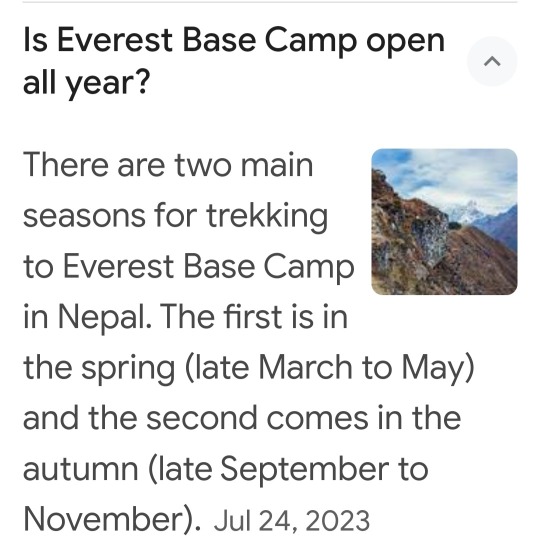
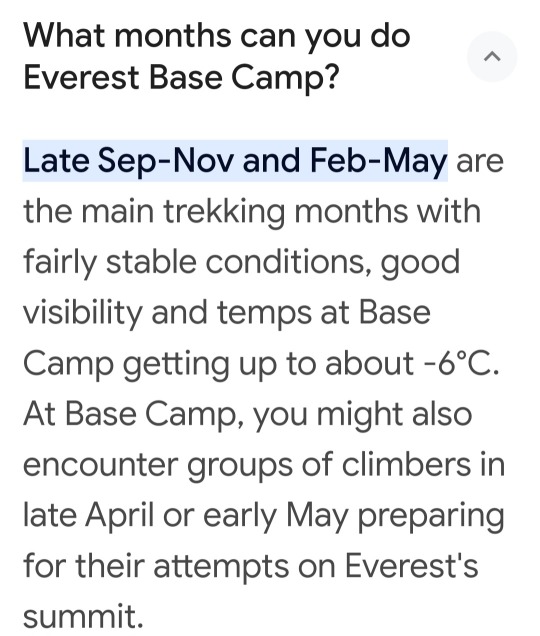
BUT, you don't simply hop on a plane and get plopped down at Base Camp's 17,000 feet altitude. You could quite literally die from High Altitude Cerebral Edema and or High Altitude Pulmonary Edema due to the low oxygen levels. Soooo, IF Sam wanted to trek to Mount Everest Base Camp in Nepal, he would have to start acclimating at least two weeks before. All travelers going from Nepal's capital, Kathmandu at an elevation of 4,344 feet stay there for a few days, and then they do a 14 day trek up the mountains, to allow their bodies to acclimate to the altitude and the lower oxygen levels. 👇
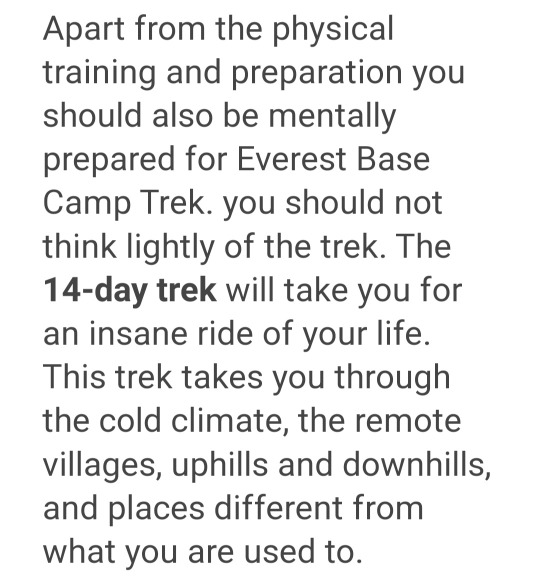
Sam would have to allow himself at LEAST 3 WEEKS to make the Everest Base Camp trek. 2 weeks to climb there and acclimate, and then you want to spend at least a week there camping and just being there. Then you have to allow time for the return climb back down. This isn't a weekend excursion.
As for whether Sam is actually trying to climb to Mount Everest SUMMIT. That would be a definite NO. Not only from an Outlander insurance and contract issue, but also because it's not summit climbing season. 👇

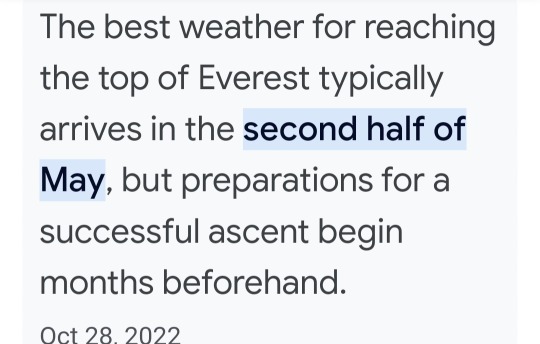
And for people who want to climb to the Summit, they have to make a 2 MONTH commitment. The summit climb entails the two weeks to climb to Base Camp. And then at least 6 weeks, climbing up and down from each of the higher camps. I think there are at least 4 camps that climbers stay at, higher and higher on the mountain, until they reach the Summit. 👇
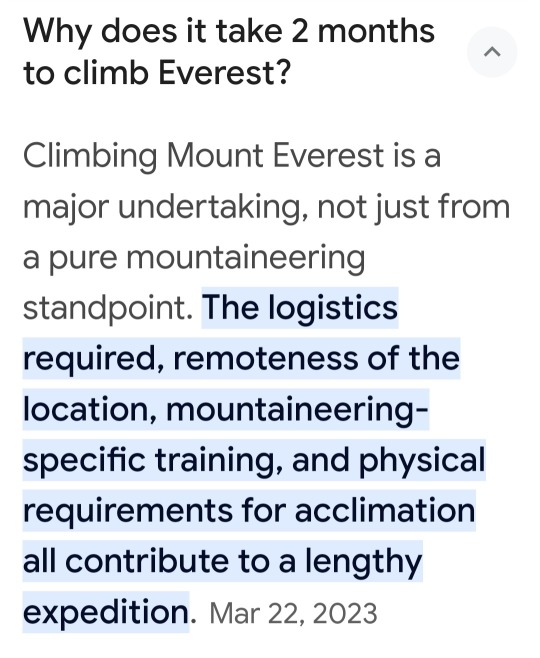
So, if a climber wants to go for a Summit bid, which is always in mid-May, they would have to start in mid-March and literally be on Mount Everest at the various camps the whole two months. It's a huge commitment. Most companies charge around $40,000 for the whole expedition. The reputable ones assign each climber a Sherpa to guide you. The Sherpas are natives to the area and they are expert climbers who are born in the area, therefore their bodies are completely acclimated to the high altitude. The expedition companies hire them to help climbers up the mountain. They set all the safety ropes, set up the camps, make the meals, and deal with the inevitable emergencies along the way. No one should climb without a Sherpa. Also, most companies will only take on a climber for a Summit bid if they can show previous experience in climbing at high altitude and have summitted a few of the highest peaks on Earth. That's not Sam. So, if anything, Sam would probably only be allowed to climb to Base Camp.
As you can see, I'm really, really into all things Everest and could keep writing all day hahaha. But, I'll stop here. I hope that was helpful info, Anon.
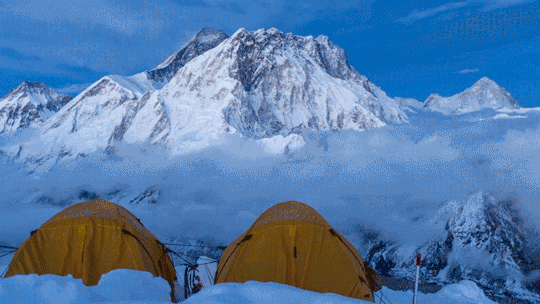
#samheughan#sam heughan#mount everest#everest#nepal#kathmandu#tibet#north side#south side#north face#south face#sherpas#base camp#everest base camp#summit#everest summit#outlander
59 notes
·
View notes
Text
Everest Base Camp Trek, 14 Days EBC Trekking Cost 2024
The Everest Base Camp trek is one of the most popular and iconic treks in the world. It takes you to the base camp of Mount Everest, the highest peak in the world at 8,848.86 m (29,031ft) above sea level. Thousands of people come from the corner of the world to travel for only one purpose that is Everest base camp trek. To complete the Everest Base Camp Trek, it is the dream of many tourists. Everest Base Camp trek is a bucket-list adventure for many outdoor travelers, offering a chance to be in the presence of the world's highest peaks and experience the beauty of the Himalayas close.
The Everest base camp trek usually begins with a thrilling flight from Kathmandu to Lukla, a small mountain town. From Lukla, trekkers start their journey on foot. The Everest Base Camp trek is considered moderately challenging. While it doesn't require any technical climbing but trekkers should be physically fit and prepared for long, uphill hikes at high altitudes. The trek takes about 12-14 days, depending on the specific route and itinerary you choose. Some of the highlights of the trek include stunning views of Mount Everest, Lhotse, Nuptse, Ama Dablam, and other peaks, Kalapathar- from where you can witness the gorgeous view of mount Everest, Sagarmatha National Park- a UNESCO World Heritage Site, crossing iconic suspension bridges, visiting Buddhist monasteries, and experiencing the unique Sherpa culture and hospitality. Along the trail, there are teahouses and lodges that offer basic accommodation and meals. The facilities are more homely at higher altitudes, but they provide a comfortable and cozy environment for trekkers. Likewise, welcome Nepal treks offers you quality services and amenities with a reasonable prices of Everest base camp trek. We have huge experience in organizing treks to the Everest Base Camp. As long as, we have knowledgeable guides, well-planned itineraries, and a good understanding of safety protocols. We can customize the trek itinerary based on your preferences, fitness level, and time constraints. However, due to its popularity, the region can get crowded during peak seasons, so booking in advance is recommended.
Overall, Everest Base Camp trek is more than just a trek. It’s an extraordinary journey that allows you to witness the glory of the Himalayas, experience the Sherpa culture, and challenge yourself physically and mentally. At last, but not the least, Everest Base Camp trek is a truly remarkable and unforgettable adventure that offers trekkers. Everest Base Camp trek is a once in a lifetime experience for many trekkers. It creates memories that will stay with trekkers forever, making it a bucket-list adventure for adventurers around the world. For more info visit https://www.welcomenepaltreks.com/everest-base-camp-trek
Looking for an Everest Base camp trek? We offer 14 days trek to Everest base camp packages at reasonable costs. Call us at +977 9841767236 for Everest base camp trekking. If you are in search of the best Everest base camp trekking package, then our Everest Base Camp Trek 14 Days Itinerary is the right one for you.
#Everest Base Camp Trek#Everest Base Camp Treks#Trek to Everest Base Camp#Everest Base Camp Trekking#Trekking to Everest Base Camp#Everest Base Camp Trek Cost#Everest Base Camp Trek Price#Everest Base Camp Trekking Cost#Everest Base Camp Trekking Price#14 Days Everest Base Camp Trek#14 Days Everest Base Camp Trekking#Everest Base Camp Trek 14 Days#Everest Base Camp Trekking 14 Days#Everest Base Camp Trek 2024#Everest Base Camp Trekking 2024#EBC Trek#EBC Trekking#EBC Trekking Cost
1 note
·
View note
Text
Everest Cho la pass Trek
The Chola Pass trek is another challenging and rewarding trekking route in the Everest region of Nepal. This trek usually takes around 14-16 days to complete and involves crossing the high altitude Chola Pass, which stands at an elevation of around 5,420 meters (17,782 feet). https://rb.gy/c4ash5 The trek to Chola Pass usually combines elements of the Everest Base Camp trek and the Gokyo Lakes trek, offering trekkers a unique and diverse experience. Along the way, trekkers can enjoy breathtaking views of the Himalayas, including Mount Everest, Cho Oyu, Lhotse, and others. It's important for trekkers to be well-prepared for high altitude and changing weather conditions when attempting the Chola Pass trek.
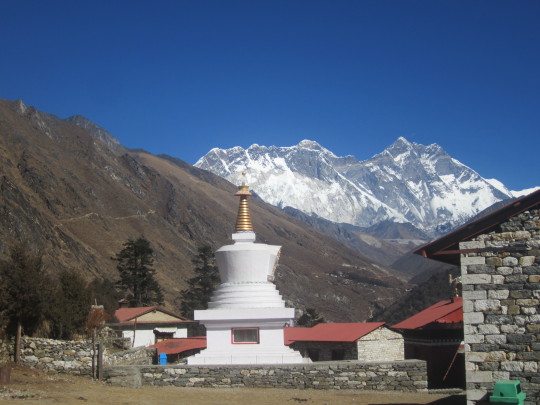
2 notes
·
View notes
Text
Beauty of Everest Base Camp Trek 2024
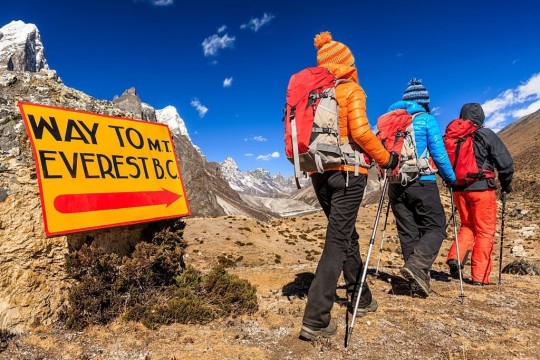
Everest Base Camp awaits a 14-day adventure. Spectacular views, Sherpa warmth, Sagarmatha Park beauty, and spiritual moments in ancient monasteries.
2 notes
·
View notes
Text
Everest Base Camp Trek - Conquer the Roof of the World!
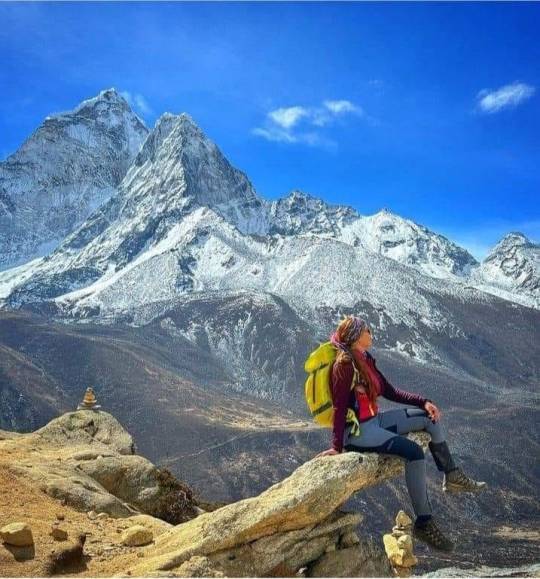
🏔️ 📅 Trip Duration: 14 days
📍 Destination: Nepal
🏞️ Trip Difficulty: Strenuous
🚍 Transport: Kathmandu - Lukla - Kathmandu
🍽️ Meals: Breakfast, Lunch & Dinner (BLD) during the trek 🏠
Accommodation: Cozy Teahouses & Lodges
👥 Group Size: Small & Personalized (Min. 1 / Max. 15)
⛰️ Max Elevation: 5,364m - Everest Base Camp
⏰ Walking Hours: 5-7 hours daily
🏁 Start/End: Kathmandu/Kathmandu
🚶♂️ Trekking Type: Local Lodge-based Tea House Trek
🌈 Best Season: February to May, September to December
🌟 TRIP HIGHLIGHTS
Trek to the base camp of the world's highest mountain, Mount Everest.
Experience the breathtaking beauty of the Khumbu region.
Witness stunning panoramic views of Everest, Lhotse, Nuptse, and more.
Explore the Sherpa culture and traditions in mountain villages.
Visit the famous Tengboche Monastery and receive blessings for a successful trek.
Travel with a small group for an intimate and personalized experience.
📋 DETAILED ITINERARY
Day 1: Arrival in Kathmandu Arrive in Kathmandu,
the bustling capital of Nepal. Meet your trekking guide and fellow adventurers. Rest and prepare for the exciting journey ahead.
Day 2: Flight to Lukla, Trek to Phakding (2,651m)
Take a thrilling flight to Lukla, the gateway to the Everest region. Embark on the trek to Phakding, passing through picturesque landscapes.
Day 3: Trek to Namche Bazaar (3,440m)
Continue the trek along the Dudh Koshi River. Climb up to Namche Bazaar, the vibrant Sherpa trading hub.
Day 4: Acclimatization Day in Namche Bazaar
Acclimatize to the increasing altitude in Namche Bazaar. Explore the town and enjoy panoramic views of Everest and surrounding peaks.
Day 5: Trek to Tengboche (3,867m)
Trek through rhododendron forests and reach the Tengboche Monastery. Experience the serene ambiance and panoramic mountain vistas.
Day 6: Trek to Dingboche (4,260m)
Descend to Debuche and cross the Imja River. Climb uphill to Dingboche, a beautiful village surrounded by mountains.
Day 7: Acclimatization Day in Dingboche
Take a day to acclimatize in Dingboche. Hike to Nagarjun Hill for breathtaking views of Ama Dablam and Lhotse.
Day 8: Trek to Lobuche (4,930m)
Trek through the moraines of the Khumbu Glacier. Reach Lobuche, a popular stop before reaching Everest Base Camp.
Day 9: Trek to Everest Base Camp (5,364m) and Gorak Shep (5,140m)
Ascend to the ultimate destination, Everest Base Camp. Witness the majestic Khumbu Icefall and the towering Everest. Descend to Gorak Shep for overnight stay.
Day 10: Hike to Kala Patthar (5,545m),
Trek to Pheriche (4,371m) Early morning hike to Kala Patthar for a stunning sunrise view over Everest. Descend to Pheriche, another beautiful Sherpa village.
Day 11: Trek to Namche Bazaar Trek back to Namche Bazaar,
enjoying the scenic landscapes. Relax and celebrate the successful completion of the trek.
Day 12: Trek to Lukla Continue the trek to Lukla,
the last leg of the journey. Reflect on the incredible adventure and bid farewell to the mountains.
Day 13: Flight to Kathmandu Fly back to Kathmandu and transfer to your hotel. Rest and celebrate the achievement of reaching Everest Base Camp.
Day 14: Departure Say goodbye to Nepal,
carrying with you unforgettable memories. Depart with a sense of accomplishment and a love for the Himalayas.
💰 COST INCLUDES
Airport transfers upon arrival and departure.
Domestic flights (Kathmandu - Lukla - Kathmandu) with airport taxes.
Accommodation in a 3-star hotel in Kathmandu with breakfast.
Tea house or lodge accommodation during the trek.
All meals (Breakfast, Lunch & Dinner) during the trek.
Licensed English-speaking trekking guide.
Porter service (1 porter for 2 trekkers) to carry your trekking gear.
Sagarmatha National Park Entry Permit.
TIMS card (Trekker's Information Management System).
All government taxes and official expenses.
🚫 COST EXCLUDES
International airfare to and from Kathmandu.
Nepal entry visa fees (available upon arrival at Kathmandu airport).
Travel and rescue insurance (mandatory).
Personal expenses such as additional meals, drinks, and snacks.
Tips for trekking staff (guide, porter, etc.).
Any extra costs incurred due to unforeseen circumstances (natural disasters, flight delays, roadblocks, etc.).
Any services not mentioned in the "Cost Includes" section.
🗨️ FOR MORE INFORMATION AND BOOKINGS, CONTACT US: Email: [email protected] WhatsApp: +977-9808262524
https://www.missionsummittreks.com/trip/everest-base-camp-trek/
🌄 Embark on a journey to conquer Everest Base Camp! 🌄
2 notes
·
View notes
Text
#everest base camp trek#everest base camp trek 14 days#everest base camp trek itinerary#everest base camp trek package#nepal everest base camp trek#annapurna circuit trek#annapurna hike#annapurna trek package#annapurna circuit trek itinerary#annapurna base camp trek#annapurna base camp trek cost#annapurna base camp trek map#annapurna base camp#manaslu circuit trek#manaslu circuit trek 12 days#manaslu base camp trekking#manaslu circuit trek package#mardi himal trek#mardi himal trek cost#mardi trek itinerary#mardi himal trek package
0 notes
Text
Ultimate Guide to the Gokyo Ri Trek: A Scenic Alternative to Everest Base Camp

The Gokyo Ri Trek is a breathtaking journey through the heart of the Everest region, offering stunning views of the world’s highest peaks, serene turquoise lakes, and a chance to experience the rich Sherpa culture. While less crowded than the classic Everest Base Camp Trek, the Gokyo Ri Trek is equally rewarding and arguably more scenic. This guide will walk you through everything you need to know to plan and prepare for this unforgettable adventure.
Overview of the Gokyo Ri Trek
Duration: 12-14 days (round trip from Lukla)
Max Altitude: 5,357 meters (Gokyo Ri)
Difficulty: Moderate to challenging
Best Time to Trek: March-May and September-November
Starting Point: Lukla
Ending Point: Lukla
Why Choose the Gokyo Ri Trek?
The Gokyo Ri Trek is a fantastic alternative to the Everest Base Camp Trek, offering:
Panoramic views of Everest, Lhotse, Makalu, and Cho Oyu from Gokyo Ri.
The stunning Gokyo Lakes, a series of turquoise glacial lakes.
A quieter and less crowded trail compared to the classic Everest route.
Detailed Itinerary
Day 1: Fly to Lukla and Trek to Phakding
Take an early morning flight from Kathmandu to Lukla (2,860 meters).
Begin trekking to Phakding (2,610 meters), a short and easy walk to acclimatize.
Day 2: Trek to Namche Bazaar
Follow the Dudh Koshi River and cross suspension bridges to reach Namche Bazaar (3,440 meters).
Namche is the bustling hub of the Khumbu region, with shops, cafes, and stunning mountain views.
Day 3: Acclimatization in Namche Bazaar
Hike to the Everest View Hotel for panoramic views of Everest, Lhotse, and Ama Dablam.
Explore the local market and Sherpa Culture Museum.
Day 4: Trek to Dole
Trek through rhododendron forests to Dole (4,110 meters).
Enjoy views of Thamserku and Kangtega along the way.
Day 5: Trek to Machhermo
Continue ascending to Machhermo (4,470 meters).
The trail offers stunning views of Cho Oyu and the surrounding peaks.
Day 6: Trek to Gokyo
Trek to Gokyo (4,790 meters), passing the first two Gokyo Lakes.
The third Gokyo Lake, Dudh Pokhari, is a breathtaking sight.
Day 7: Hike to Gokyo Ri and Explore Gokyo Lakes
Early morning hike to Gokyo Ri (5,357 meters) for sunrise views of Everest, Lhotse, Makalu, and Cho Oyu.
Spend the rest of the day exploring the fourth and fifth Gokyo Lakes.
Day 8: Trek to Dole
Descend from Gokyo to Dole (4,110 meters).
Enjoy the changing landscapes and mountain views.
Day 9: Trek to Namche Bazaar
Retrace your steps to Namche Bazaar (3,440 meters).
Celebrate your achievements with fellow trekkers.
Day 10: Trek to Lukla
Descend to Lukla (2,860 meters), marking the end of your trek.
Celebrate with your team and enjoy a well-deserved rest.
Day 11: Fly Back to Kathmandu
Take an early morning flight from Lukla to Kathmandu.
What to Pack
Essential Gear:
Sturdy trekking boots
Warm layers (thermal base layers, fleece, down jacket)
Waterproof jacket and pants
Sleeping bag (rated for -10°C)
Trekking poles
Backpack (30-40 liters)
Other Essentials:
Sunglasses, sunscreen, and lip balm
Water purification tablets or filter
First aid kit and medications
Snacks and energy bars
Camera and extra batteries
Tips for a Successful Trek
Train in Advance: Build your stamina with cardio and strength training.
Acclimatize Properly: Take rest days and stay hydrated to avoid altitude sickness.
Hire a Guide or Porter: A local guide can enhance your experience, and a porter can ease your load.
Respect Local Culture: Dress modestly, ask for permission before taking photos, and follow local customs.
Travel Insurance: Ensure your insurance covers high-altitude trekking and emergency evacuation.
Best Time to Trek
The best time to trek to Gokyo Ri is during the pre-monsoon (March-May) and post-monsoon (September-November) seasons. These months offer clear skies, stable weather, and the best mountain views.
Challenges and Rewards
The Gokyo Ri Trek is physically demanding, with long walking days, steep ascents, and high altitude. However, the rewards are unparalleled:
Panoramic views of Everest and other 8,000-meter peaks from Gokyo Ri.
The serene beauty of the Gokyo Lakes.
A quieter and more peaceful trail compared to the classic Everest route.
Final Thoughts
The Gokyo Ri Trek is a stunning alternative to the Everest Base Camp Trek, offering breathtaking scenery, rich cultural experiences, and a sense of accomplishment. With proper preparation and a spirit of adventure, this trek will leave you with memories to last a lifetime.
0 notes